The 3rd Asia-Pacific CBR Congress
Emerging Group-Persons with Psychosocial Disabilities in Nepal
-Mr. Shaurabh Sharma, CBM and Ms. Leela Khanal, KOSHISH
Background
Psychosocial disability is increasingly recognized as resulting in individual social exclusion, and being an important factor for frustrating the aspirations of families, communities in emerging economies. World Health Organisation (WHO) estimates that 1 in 4 people experience an episode of mental disorders or psychosocial problem in their lifetime, and that approximately 600 million people worldwide are disabled as a consequence. Psychosocial disability is one of the most pressing development issues of our time. Poverty and hunger, conflict and trauma, poor access to health and social care, and social inequity are significant risk factors, increasing vulnerability to persons with psychosocial disabilities in low and middle income country contexts.
Although the Government of Nepal has defined mental health as disabling condition out of seven and included mental health services as a basic primary health care component, significant strides have yet to be made for wide-scale promotion of mental health services in Nepal. A 2006 study of WHO Assessment Instrument for Mental Health Systems (WHO-AIMS) reports that less than one percent of all health expenditures are directed towards mental health in Nepal (0.17 percent). Mental health services in Nepal remained unknown till 1961 and there were no training facilities for psychiatrists, clinical psychologists and psychiatric nurses in Nepal, before 1997 (Sedain, 2014). The demand for mental health services has grown in recent years as Nepal is still reeling through post conflict social unrest, violence, extortion and disasters.
Since 1982, CBM working with local partner organisations in Nepal to ensure that persons with disabilities and their families have access to:
- Affordable and comprehensive health care and rehabilitation programmes specifically on eye, ear, orthopedic, psychosocial care,
- Inclusive education programs, and
- Livelihood opportunities and skills development of women, men and children with disabilities
Working with persons with disabilities, CBM advocates for their inclusion in all aspects of society, so engaged with stakeholders at central level.
KOSHISHi aims to mainstream psychosocial disability into all aspects of development and empower persons with psychosocial disabilities to take an active role in their communities through inclusion in development projects and involvement in community initiatives. With this aim when CBM together with KOSHISH reached the ancient archeological city of Bhaktapur in 2010 AD to address this issue of health and disability at the community level, there was not a single initiative even at the district level. According to the 2011 census and its projection rate, the population Bhaktapur District is 304,651. The population of persons with disability in Bhaktapur District is officially stated as 791 persons out of whom 86 are persons with psychosocial disabilities. In spite of being part of Kathmandu Valley and several INGOS and NGOs supported programs running there, mental health services were completely absent. The stigma, discrimination and exclusion against the people with mental health problems prevailed deeply. The inhuman practices against the people with mental health problems like chaining, tying to wooden logs and locking in separate rooms were widespread throughout the district.
Intervention
In the aforesaid scenario, we started the project which had a number of levels, all of which worked towards delivering a holistic approach for the inclusion of persons living with psychosocial disability. In line with CBR guideline, project aimed to improve access to health care, livelihood and empowerment services for persons with psychosocial disabilities. Under the health component, the project has been operational to improve the mental health of people with psychosocial disabilities. We started a psychiatric OPD service in collaboration with Bhaktapur Hospital. However, large numbers of people attending the OPD service were not able to buy medicines prescribed at the hospital and the adherence rates among the clients was poor. Most of the agencies at district were completely unaware of the dire necessity to incorporate mental health program in district development agenda. CBM supported the project for existing psychosocial disabilities and prevention of conditions which could lead to psychosocial disability.
At second level of matrix, we worked to empower mental health service users to improve the quality of life of people with psychosocial disabilities. KOSHISH and CBM started by building awareness in clinics run by Bhaktapur Hospital. The team explained that a SHG could aim to provide health education, identify clients in the community, refer them for treatment, help prevent relapses and provide mutual support We have also worked out on economic empowerment of SHG members through skills and enterprise development, income generation activities under the 3rd component of the matrix.
Methodology
In this context, we organized the people with psychosocial disability and their family members from Bhaktapur Municipality and Katunje Village Development Committee (VDC) into two Self Help Groups (SHGs) called Aasha (HOPE) and Sahara (SUPPORT) respectively.
Each of the SHGs functioning in Bhaktapur comprised of 15 active members, who are the; persons with psychosocial disability and their family members. The group launched several awareness campaigns at formal and informal levels. The formal program included awareness class at schools, which aimed at providing basic information on the nature and symptoms of mental health problems and their possible management to children. The SHGs participated at a ward level gathering at the Municipality and VDC and tabled their demands for the budget allocation for mental health services. The demands were even followed up at the VDC and Municipal council meetings. Even though the demands were not adequately addressed, the matter of mental health made its presence felt as an important issue of development in the local development designing process.
Result and Outcome
The four year community mental health program in Bhaktapur, has seen some positive benefits at limited expense. First, the service seeking tendency among the people with mental health is on rise. When the first Psychiatric OPD was started in the month of January 2011 only 7 persons with psychosocial disability attended the OPD service. At the end of December 2011 it was reached to 17 persons. Likewise, at the end of December 2014 it has reached to 30 persons. Now every month 40 persons are receiving mental health services in their own community. Second, people with a psychosocial disability have felt so empowered as to fight for their disability identity card and to include mental health issue as valid agenda in the local development process. 18 members of SHG are trained on their rights and entitlement. 6 members of SHG participated at 2 ward level gathering at the Municipality and VDC. In the meetings, firstly SHG members were able to discuss about the disability card for persons with psychosocial disability. Second was insertion of program and budget of mental health into Municipal and Village development plans. Third issue of discussion was about the availability of psychotropic drugs which are enlisted in the free essential drug list. Furthermore, their involvement in a local enterprise has earned them some money, which has not only introduced in them a sense of worth but also independence in being able to contribute to their own medication. Since 2011, members of SHG were receiving medication support from the project. By December 2014, members of SHG are able to earn NPR13,000 by selling velvet shoes in the local market. By end of 2014, they are contributing for their medication by own. The most significant success is that mental/psychosocial disability has been accepted as a significant health and disability issue in Bhaktapur. Bhaktapur Hospital and SHG members have taken ownership of continuing mental health services in their community. Now every month members of SHG and Bhaktapur Hospital are paying for the psychiatric visit. Likewise, Urban Health Clinic of Chyamasing, Katunje has also requested KOSHISH and CBM to establish psychiatric OPD and counseling services in collaboration.
Conclusion and Recommendation
It is learned that Self-help groups give members an opportunity to discuss their experiences and to share their thoughts on their lives, their feelings, and recovery. Recovery for people with mental/psychosocial disability is a journey, not a destination. It is a way of living a satisfying, hopeful and contributing life, even with the limitations caused by the mental/psychosocial disability. At every step on the journey to recovery, they need to regain a sense of self-management and self-direction. People with mental/psychosocial disability who have faced stigmatizing experiences usually feel ashamed or demoralized, but in a SHG, this experience is turned into an asset what was once a stigmatizing experience is now seen as a shared experience, where all members of the group can learn coping skills from it. The success of SHGs of people with a psychosocial disability has now become a template for others to follow. The success could be replicated to improve the psychosocial wellbeing of people with mental/psychosocial disability across the country. Now, we are confident that we can use a similar approach for the newly selected Tanahun District. The project of Tanahun will aim to replicate this success of self-empowerment, as well as helping the SHGs to build its capacity as a self-sustaining organization. This can be done through further collaboration and capacity building with community and regional policy bodies to consolidate diverse experiences into wider opportunities for learning.
This story ends with some recommendation. First, the program should be about stimulating bottom-up change, as it helps to develop confidence and advocacy skills in people with a psychosocial disability. They are therefore better able to access services and resources. Another recommendation is to choose the group income generating activities that employ locally available resources to ensure the long term sustainability of the group. It is also suggested to place an emphasis on promoting group savings to also achieve this sustainability goal. It could be that with greater involvement by the project beneficiaries and the implementing agencies in the project design and implementation may help to address this goal of sustainability.
Reference
- Sedain CP (2014). Mental Health Services in Nepal. Retrieved 25th of January, 2015 from http://drcpsedai.blogspot.com/2014/01/mental-health-services-in-nepal.html Funda Mental SDG (2014).
- Include Mental Health in the Sustainable Development Goals. Retrived 28th of January, 2015 from http://www.fundamentalsdg.org
- World Health Organization (2006). A report of the assessment of the mental health system in Nepal using the World Health Organization - Assessment Instrument for Mental Health Systems (WHO-AIMS). Retrieved 28th of January, 2015 from www.who.int/mental_health/evidence/nepal_who_aims_report.pdf
- Central Bureau of Statistics (2011). National Population and Housing Census 2011. Retrieved 28th of January, 2015 from http://cbs.gov.np/wpcontent/uploads/2012/11/NationalReport
i Koshish is a Nepali word which means putting effort for something. In this context people with psychosocial disability trying to change social attitude towards people with psychosocial disability and protecting and promoting their human rights
Slide 1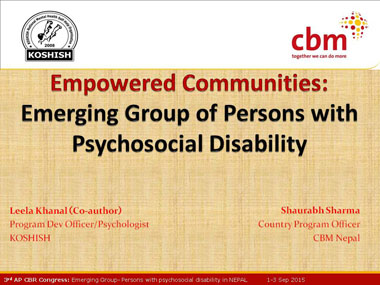 (Slide 1 text)
(Slide 1 text)
Slide 2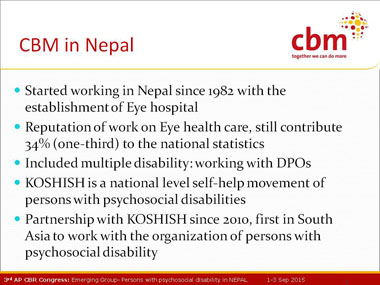 (Slide 2 text)
(Slide 2 text)
Slide 3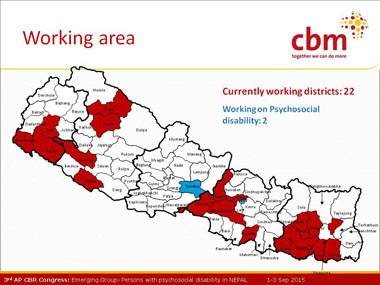 (Slide 3 text)
(Slide 3 text)
Slide 4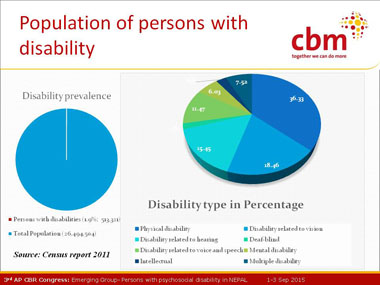 (Slide 4 text)
(Slide 4 text)
Slide 5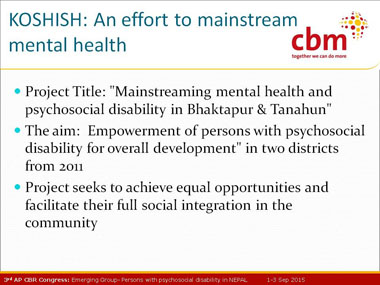 (Slide 5 text)
(Slide 5 text)
Slide 6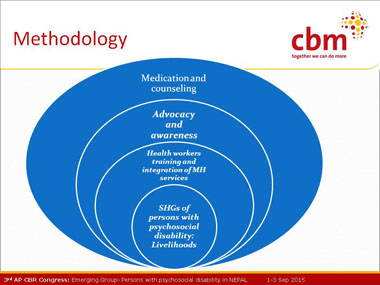 (Slide 6 text)
(Slide 6 text)
Slide 7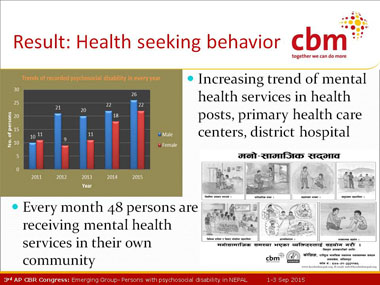 (Slide 7 text)
(Slide 7 text)
Slide 8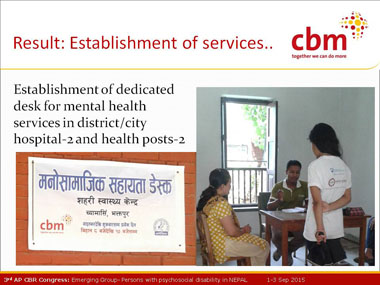 (Slide 8 text)
(Slide 8 text)
Slide 9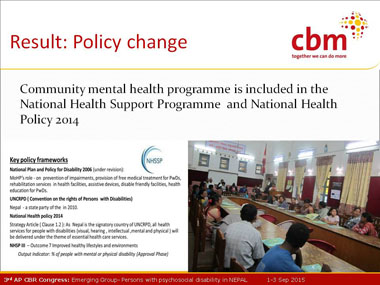 (Slide 9 text)
(Slide 9 text)
Slide 10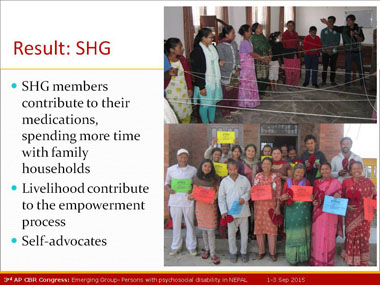 (Slide 10 text)
(Slide 10 text)
Slide 11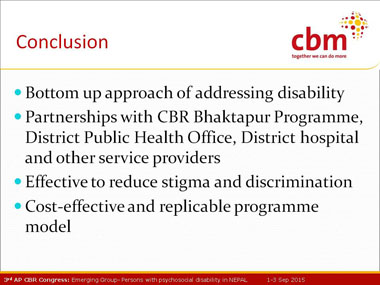 (Slide 11 text)
(Slide 11 text)
Slide 12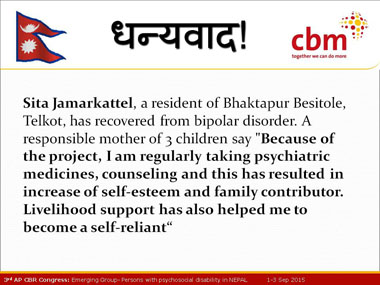 (Slide 12 text)
(Slide 12 text)
